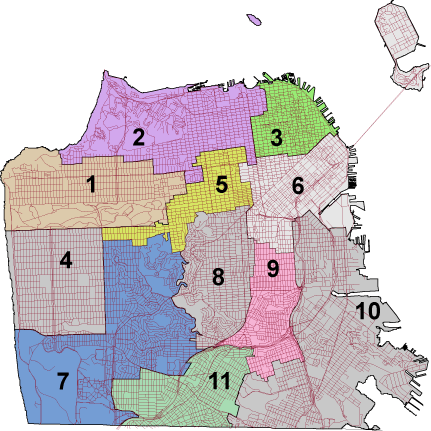Since 2004, San Francisco has used an instant runoff process to elect its mayor, board of supervisors, and other officers. This way, voters rank their choices on one ballot, rather than vote for one candidate in one election and then another in a separate runoff election. Here, you can see past results and try Ranked Choice practice polls.
| Candidate | 1st choice | 2nd choice | 3rd choice |
|---|---|---|---|
| Lou |  |
 |
 |
| Bob |  |
 |
 |
| Kim |  |
 |
 |
Your vote will count for your highest-ranked candidate,
but some candidates
may be eliminated.

|
|||||
| Kim |
|
||||
| Lou |
|
||||
| Bob |
|

|
||||||
| Kim |
|
|||||
| Lou |
|
In this count, because Bob was eliminated, your vote counted for Kim, your second choice.
November 2024 results summary
The mayoral contest had 13 listed candidates and 2 qualified write-ins, with 4 strong first-round contenders. 10 ranking columns were provided, the maximum that the Dominion voting system can provide, and the first time this has been done. 12.2% of voters cast valid votes (one vote per column) in all 10 columns. 15.8% ranked more than 5 candidates, the limit imposed in Oakland's at-large council contest. 4.1% of votes cast in the final round were from 6th through 10th choices. Only 0.18% of voters ranked all 10 columns but did not include Daniel Lurie or London Breed, so their ballots were exhausted in the final round. Lurie prevailed over incumbent Breed with a strong final-round mandate.
London Breed was not the only deposed incumbent: in supervisorial district 5, Bilal Mahmood pulled ahead to establish a strong final-round victory over incumbent Dean Preston. Incumbents Connie Chan and Myrna Melgar withstood challenges in districts 1 and 7. Districts 3, 9 and 11 were open seats. In district 11, Chyanne Chen started in second place, then took a narrow lead in the final round.
Practice poll
Try casting your own ranked-choice vote in this ongoing online poll.
| Vote | Results | ||
| Favorite San Francisco Zoo Animal |
|
 |
 |
Past results
This page shows results of multi-round ranked-choice elections in San Francisco since 2004, as an independent
and unofficial interpretation
of cast vote records released by the Department of Elections.
The total number of votes countable in at least the first
round of the 41 multi-round elections shown here from 2004 to 2022 is 2,815,767.
The results released by the Elections Department separate out all "overvotes" (more than one vote in the same column), whereas the DemoChoice
software treats second- or third-choice overvotes as votes for "none of these". Ballots with no rankings or with first-choice overvotes do not appear
in the DemoChoice results.
Improvements to the city's vote-counting software and released ballot data have provided greater transparency regarding how some
strange cases are treated. If a ballot gives one listed candidate and an unqualified write-in the same ranking, or one eliminated candidate and one continuing candidate the
same ranking, should these each be an overvote, so that ranking and lower rankings are uncountable? Currently, that is what happens.
** indicates contests where the winner overcame the leading first-round candidate in later rounds.
* indicates contests where a candidate who was not one of the top two in the first round was in the top two in the final round.



